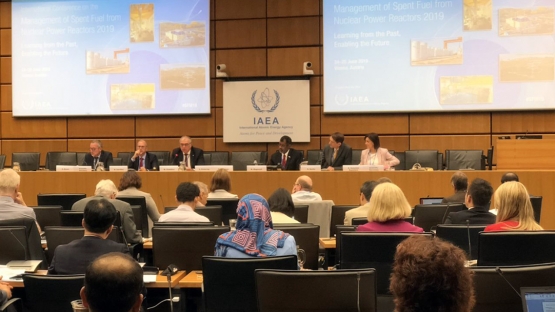As some countries consider innovative recycling technologies to reduce the burden of radioactive waste, others need to bridge the gap between their current generation of nuclear spent fuel and its future disposal in planned underground facilities. These were among the main conclusions of the 2019 International Conference on the Management of Spent Fuel from Nuclear Power Reactors, the proceedings of which have now been published.
The conference, held at the IAEA’s Vienna headquarters in June last year, provided a forum for over 250 participants from 45 countries and 7 international organizations to share information and experiences on the safe, secure and sustainable management of spent fuel from nuclear reactors. Successful spent fuel management is key to the sustainability of nuclear power and must be addressed from the onset of a nuclear programme.
“Sharing data, operational experience and collaboration in research can lead to attainable solutions in spent fuel management,” said Amparo González Espartero, an IAEA spent fuel expert and one of the scientific secretaries of the conference. “These proceedings bring together the expertise and experience of countries with decades of nuclear power operation, which can be shared internationally including with countries considering or embarking on nuclear power,” added Gérard Bruno, also an IAEA spent fuel expert and conference scientific secretary.
While spent fuel has been safely managed for decades, it is a complex undertaking involving storage, transportation and either recycling or disposal in a deep underground repository. In recent years, good progress has been made in developing disposal solutions, with the first underground geological facility set to become operational in Finland this decade.
For some countries, recycling spent fuel continues to play an important role, the conference noted. Some are considering innovative technologies to reduce both the burden of generated wastes and the footprint of disposal facilities, such as by recycling long-lived products for medical applications. Fast reactor technologies based on a closed fuel cycle is one of the recycling strategies. While full scale deployment has been delayed, interested countries continue research and development activities, the conference noted.
Other national strategies will need sufficient storage capacity to bridge the gap between the generation of spent fuel and the planned commissioning and operation of geological disposal facilities, according to the proceedings.
Regardless of the solution chosen, the conference underscored a need for countries to understand and optimize the so-called back end of the nuclear fuel cycle—and to actively implement their strategy while engaging relevant stakeholders throughout the process.
“For nuclear power to be sustainable, the safe, secure, reliable and efficient management of its fuel cycle is paramount,” said Mikhail Chudakov, IAEA Deputy Director General and Head of the Department of Nuclear Energy. “Much can be gained from sharing knowledge, experiences, lessons learned and best practices.”





